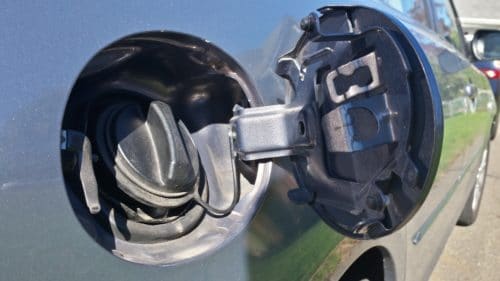
Amanda Peterson (left) and Maryem Abudurra (right) are displeased with the proposed gas tax increase.
Photo Credit: Victoria Testa
The proposed 23-cent increase to the New Jersey gas tax is “going to make everything way more complicated,” said Maryem Abudurra, a junior biology major at Montclair State University. “I feel like there should be other ways to go about [raising the money].”
The increase in taxes is to help fund the Transportation Trust Fund, but students at Montclair State are generally unimpressed with the proposal.
“I feel that the money should come from a different source,” said Amanda Peterson, a junior biology major. “If it keeps increasing, I’ll have to fill up three times as opposed to two times a week, and honestly I can barely afford two times.”
“I just think it’s a bad idea,” said Abudurra. “It’s just too much.” New Jersey lawmakers reached a settlement last week that proposes a significant increase to the New Jersey gas tax, which would leave New Jersey citizens paying 37.5 cents in taxes per gallon, well above the nation’s average of 21 cents.
The increase, due to go into effect in the beginning of November, will affect a large number of New Jersey citizens, namely college students. Montclair State University, a state school with approximately 60 percent commuter students, is especially vulnerable to the negative effects that may go hand in hand with the increase.
Peterson commutes 20 minutes each way, to and from campus, five days a week. She argued that over time, the increase, though seemingly small, will add up and make commuting costs much more than what they currently are.
“I’ll have to carpool with someone, and that’s a hassle,” said Peterson.
Governor Chris Christie is expected to sign the bill approving the tax hike in the upcoming weeks, but some Montclair State students believe that there is still a better way to raise the money without putting such a burden on citizens that lawmakers haven’t necessarily explored.
“You could just raise tolls,” offered Peterson, who doesn’t often travel on toll roads. “I know that gets done a lot and people already complain about that, but why not?”
On the other hand, Abudurra said that if a gas tax increase is absolutely necessary, then it should be tiered and rolled out over time. “It should be done at least gradually, so that people could get used to it, not so one day it’s $1.79 for gas and the next day it’s like, ‘I wasn’t prepared for this,’” she said.
“If you’re going to do it, do it more subtly,” Peterson said.
The increase may end up influencing future enrollment as well, students predicted.
“People will consider just not coming here if they were going to commute,” said Peterson, referencing prospective students in the upcoming years. “The general attitude towards commuting is just going to be anger.”
Overall, Montclair State students agreed that the gas tax increase is unwelcome and likely to affect many people on campus. However, with the hike expected to be put in place sometime over the next month, students can only begin to brace themselves.
“There is one positive outcome,” joked Abudurra with a chuckle. “Car Parc [Diem] will be empty!”



